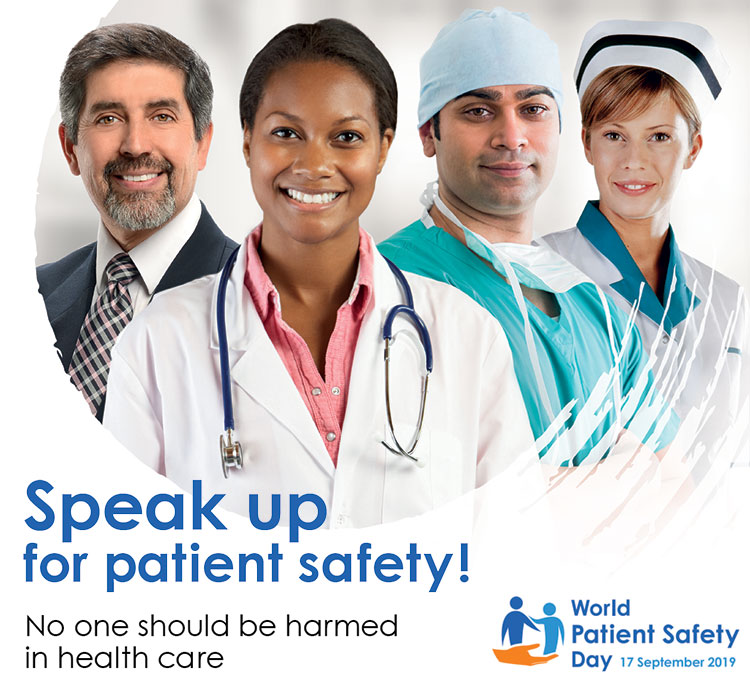
17 September 2019 – On 17 September 2019, the world celebrates the first ever World Patient Safety Day under the theme “Patient safety: a global health priority”. The global campaign aims to create awareness of patient safety and WHO encourages everyone to speak up for the right of people to safe health care.
World Patient Safety Day is also a call for patients who suffer harm in health care to be actively involved in their care, well informed of their situation, provided full information about their medical history and asked questions while receiving health care.
Patient safety is a serious global public health concern. Estimates show that in high-income countries, as many as one in 10 patients is harmed while receiving hospital care. The harm can be caused by a range of adverse events, of which almost 50% are preventable.
Without improving people’s access to quality health care services ‒ a fundamental principle of universal health coverage and key to achieving health-related Sustainable Development Goal (SDG) 3 ‒ the occurrence of adverse events, resulting from unsafe care, is likely to become one of the top 10 leading causes of death and disability worldwide.
On this occasion, WHO Regional Director for the Eastern Mediterranean Dr Ahmed Al-Mandhari calls on community leaders and patient advocacy groups to encourage patients to speak out and insist on their right to receive safe, good quality health care services that meet their needs.
“Unsafe health care is a particular burden in low- and middle-income countries, especially those facing emergencies and extreme adversity. It is unacceptable that unsafe health care services in these countries still lead to 134 million adverse events annually, accounting for nearly 2.6 million deaths globally – especially now that achievement of UHC has been recognized as a critical global health goal,” the Regional Director said. “Crucially, unsafe care not only harms individual patients; it also wastes precious resources, undermines people’s trust in the health system and hinders country progress towards UHC.”
In the Eastern Mediterranean Region, evidence has shown that up to 18% of hospital admissions are associated with adverse events, 80% of which are preventable. Patients may be at risk of harm if the care they receive is not satisfactory, whether that is because it is delayed, inefficient, inequitable, of poor quality, not based on the latest evidence or represents a financial burden on the patient and their family.
The provision of safe services is extremely important across all levels of health care, including in primary and outpatient (ambulatory) care, where the bulk of services are offered. Globally, as many as four out of 10 patients are harmed while receiving health care in these settings, with up to 80% of this harm preventable. The most detrimental errors are related to diagnosis, prescription and the use of medicines. Harm in primary and ambulatory care often results in hospitalization.
Examples of recommended interventions to ensure safer care include improving hygiene standards, in particular hand hygiene compliance, using pre-operative checklists to reduce surgical complications, and implementing care bundles to prevent central line-associated bloodstream infections.
Effective infection prevention and control reduces health care-associated infections by at least 30%.
Promoting a culture of safety that uses mistakes as opportunities for learning rather than blaming individuals is also key for understanding the root causes of the problems and preventing their reoccurrence.
On World Patient Safety Day, WHO recommends that effective patient safety must be based on people-centred health care and reiterates that patient safety is not a one-day event or the sole responsibility of a single entity; rather, it requires sustained collaboration and coherent strategies that embrace everyone. We all need to speak up for patient safety.
Message of the WHO Regional Director for the Eastern Mediterranean on World Patient Safety Day
Related link
For more information, please contact:
Dr Mondher Letaief
WHO Regional Advisor for Quality and Patient Safety
Mobile: +201028011579
Mona Yassin
Communications Officer
Mobile: +201006019284


